Dragon’s Dogma 2 Best Vocation Tier List
Looking at the best Vocations in Dragon's Dogma 2.
Vocations are the classes of Dragon's Dogma 2 and decide what kind of combat you'll be using, along with the Weapon and Core Skills you'll be able to unlock. For this reason, it's a good idea to figure out what is the best Vocation for you and, to help you make this decision, we've made a best Vocations tier list for Dragon's Dogma 2.
You can choose the Vocation for both the Arisen and your Main Pawn during the opening hour of Dragon's Dogma 2. Thankfully, you're not tied to this decision and can change both Vocations whenever you like through respeccing.
If you're planning out your Main Pawn in particular, then it's worth checking out our best early game Pawn build recommendations. We've also listed all of the Vocations, including how to unlock them.
So let's take a look at the best Vocations in Dragon's Dogma 2, starting with our Vocations tier list.
On this page:
Best Vocations tier list for Dragon's Dogma 2
Below you'll find our best Vocations tier list for Dragon's Dogma 2.
Before we begin, there are two important factors to remember with this tier list. Firstly, it is subjective to our experience with the game, so you might rank the Vocations differently. We detail the reasons for our rankings after the table and look at each Vocation in detail further along in this guide. Secondly, this list focuses on the player Vocations, not the Pawns.
With that out of the way, here's our Dragon's Dogma 2 best Vocations tier list:
| Tier | Vocation |
|---|---|
| S | Mystic Spearhand, Magick Archer |
| A | Thief, Sorcerer, Warrior |
| B | Mage, Fighter, Warfarer, Archer |
| C | Trickster |
With its mixture of melee and magic attacks, Mystic Spearhand easily tops the tier list. It also offers great mobility in battle by allowing you to easily dash or teleport between enemies as you quickly deal hits. There's also an element of support thanks to the Mirour Vesture skill, which creates a shield around yourself and nearby Pawns. You can even unlock the Mystic Spearhand Vocation early on in the game if you know where to look.
Next up comes Magick Archer - the advanced version of the Archer Vocation which adds an element of magic to your bow. Magick Archer's have the ability to aim for an enemy's weak support automatically and are also able to provide support by healing Pawns. If this is Vocation for you, then you need to remember to stay on the edges of the battlefield as it's not designed for up close combat. Though the ability to shoot enemies out of the sky is always handy.

Being a Thief is all about dealing a lot of damage very quickly. Yes the amount of damage Thieves can deal is less compared to other Vocations, but the number of hits they can easily deal makes up for this fact. It's important to keep an eye on your stamina when playing as Thief, because, without it, you won't be able to take advantage of their ability to cling to enemies or sneak around to position for attacks.
When it comes to causing area-of-effect damage in Dragon's Dogma 2, the Sorcerer is king. Whether it's setting enemies on fire or freezing them, Sorcerers have a strong range of skills at their disposal to bring as much damage as possible. The downside, however, is how much stamina these spells use up. Coupled with long casting times, this means Sorcerers will often find themselves standing on the edge of battle switching between weaving a spell and recharging their stamina. Sure the Quickspell skill speeds up your ability to cast, but you'll still need to manage your stamina carefully.
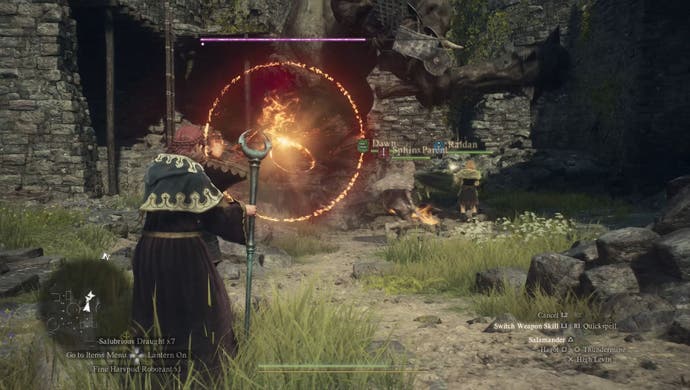
The Warrior Vocation ditches defence to focus on offence. Able to deal a great amount of damage with one swing of their massive sword, Warriors are a strong melee-focused tank; perfect for stunning enemies and breaking up a crowd of foes. Where Warriors stumble, however, is their utter lack of mobility in combat - they are heavy, they are slow. Due to this, you need to ensure you have the right armour if you're playing as a Warrior. If not, you risk leaving yourself open.
From healing your party to offering elemental boosts, the Mage Vocation is all about support. For this reason, while incredibly useful and basically essential to any party, it's better to make your Main Pawn a Mage rather than being one yourself. (Unless you really like playing support of course.) You may want to make Mage your starting Vocation if you're planning on mainlining as a Sorcerer later on since it's a good introduction to the magic mechanics of Dragon's Dogma 2. Still we highly recommend always having a Mage Pawn in your party.

Fighter offers a good balance between offence and defence; allowing you to protect yourself from oncoming attacks with a shield, before unleashing some blows of your own. This ability to block attacks comes at a stamina cost though and, while this can be fixed using Augments, you'll need to increase the rankings of other Vocations to use them. Still, Fighter is a good starting Vocation, especially for players who prefer melee combat, and even have the ability to climb atop of enemies, but are less skilled at it compared to the Thief Vocation.
I'll admit that deciding where to place the Warfarer Vocation was tough. Sure it has amazing versatility, offering you the chance to mix-and-match from across other Vocations, and, on paper, this sounds like the ideal opportunity to create a unique build. Yet, in practice, a master of all can easily be a master of none or, to be more accurate, a master who has to carry any weapons. Want to include an Archer skill and a Warrior skill in your build? Well get ready to carry both a bow and a greatsword, then switch between them if you want to use the skills.
Thankfully the Rearmament Weapon Skill allows you to do this in combat, but at the cost of using up one of your skill slots and, if you want to use the Warfarer Vocation properly, you must have this equipped. This does dampen the Warfarer experience somewhat as, despite its apartment freedom, you're tied to that one skill and its lower base stats compared to the other Vocations. Yet, if you fancy experimenting with this Vocation, then it's still worth a shot.

Archers are, unsurprisingly, ranged fighters who should remain on the edge of combat where they can easily snipe foes. They may deal less damage compared to the Vocations, but, like with the Thief Vocation, the amount of attacks they can quickly deal makes up for this fact. Archers can also easily knock a flying enemy out of the sky if their aim is true. The problem arises in how many of their skills require you to aim with your bow first, which can make it difficult to hit a fast moving attack. Due to this, and their focus being on support, it's better to have a Pawn with this Vocation rather than undertaking it yourself.
Finally, we come to Trickster and, firstly, let's all admit that this was such a cool idea. The Trickster's main problem though is that to be one, you must ensure you're accompanied by a powerful set of Pawns especially during its early stages. This is because Trickster is such a support Vocation that it barely causes any damage and is instead focused on creating situations where your Pawns do most of the work for you. Don't get us wrong, Tricksters will have access to an interesting skill set, including creating clones, fake walls and even an illusionary dragon. You just have to unlock them first and that means ranking up your Trickster Vocation. This leaves you very reliant on your Pawns and, if they're unable to battle, you might not last long yourself.
What the Trickster Vocation does have going for it, however, are some incredibly useful Augments. This includes Detection which will highlight any Seeker's Tokens or Wakestone shards close to you during your travels, Fugacity which decreases your chance of being ambushed when travelling by oxcart or camping and Allure which helps you raise affinity with NPCs. (Very useful if you're planning on romancing someone.) Due to this, despite not being ideal for combat, it's still worth increasing your Trickster rank for these Augments.

Best early game Vocations in Dragon's Dogma 2
When you first start Dragon's Dogma 2, you'll only have access to four Vocations, so knowing the best starting Vocation is quite useful:
While the answer to which one is best for the early is subjective to your playstyle (sorry, annoying answer I know), you can take a look at our Vocations tier list in the above section to get an idea of which one might suit you best. We also take a more in-depth look at each starting Vocation further along in this guide.
Before we take an individual look at these four Vocations, there are some important details to note. The first is that it's worth changing your Vocation every so often; not only to experiment with the different combat styles Dragon's Dogma 2 offers, but to unlock additional Augments since they can be used across Vocations. This means if you unlock a Mage Augment but switch to the Thief Vocation, you can still apply this Augment. Since you can have up to six Augments, it's a good idea to do some mixing and matching to create your perfect build.
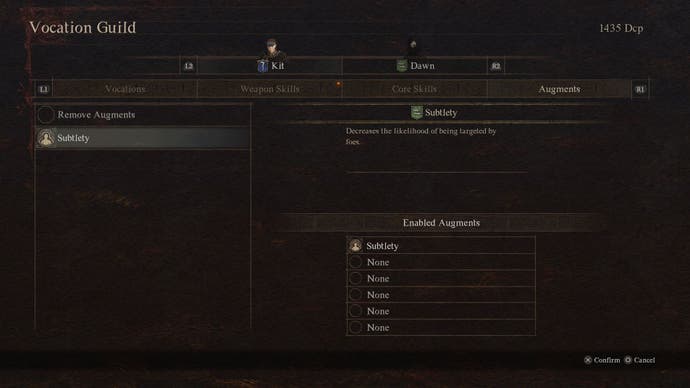
Secondly, each Vocation has 10 Ranks - the higher your Rank, the more Weapon Skills, Core Skills and Augments will be available to you. A Vocations Rank is raised by using said Vocation in combat. It's important to remember that Vocation Ranks are not shared between the Arisen and the Main Pawn. This means you'll always be starting from Rank 1 when you choose a new Vocation. Thankfully, your Rank progress is saved when you switch Vocation, so you're free to jump back and forth as much as you like.

Thirdly, it's a good idea to have your Main Pawn's Vocation complement your own to ensure you're covering your weaknesses. If you go for the melee-focused Fighter, for example, then consider having your Main Pawn be an Archer to include some ranged attacks in your team. The Main Pawn's Vocation, like the Arisen, can be changed as many times as you like and our how to change Vocation guide will walk you through the process. We also have some early game Pawn build recommendations.
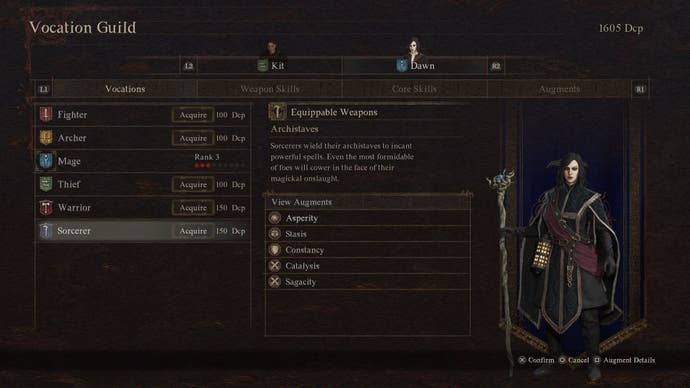
Personally, I started Dragon's Dogma 2 as a Thief because I like fast paced combat. Meanwhile, my Main Pawn was a Mage due to their healing capabilities and the elemental boosts they could provide for my own attacks. I later switched to a Sorcerer - a decision partly driven by my desire to wear a cool hat and want to experiment with a different combat style. At the same time, I switched my Main Pawn's Vocation to Thief since I wanted to fill the melee defence spot I had opened up in my party and the knowledge I had gained while playing as one helped me craft their new build. (Also I could switch over my equipment, so I'd have more money saved for the future hat.)
With that out of the way, here's all the starting Vocations in Dragon's Dogma 2:
Fighter
Fighter is perfect for anyone who prefers a balanced approach to up-close melee combat thanks to how it allows you to wield a shield. Due to this, Fighters have the ability to defend against up-close enemy attacks. This means you can deflect oncoming attacks and, in doing so, potentially create an opportunity for you to exploit an enemy's weaknesses. You'll want to keep an eye on your Stamina when defending though, because, not only will it recover slowly, but you'll lose Stamina if your shield takes a hit.
You also have the ability to conduct follow-up attacks when playing as Fighter if your opponent is down, knocked off balance or not expecting your attack. Once again, this grants you the perfect chance to unleash some strong Weapon Skill. The downside, however, is that it will leave you vulnerable for a short period of time.

If you're planning on playing as Fighter, then consider having your Main Pawn be either an Archer or a Mage. An Archer will provide useful range attacks, lowering the enemy's health while you deal your own blows, while the Mage has the ability to heal you.
Here are the Fighter Augments:
- Mettle - Augments your physical Defence.
- Provocation - Increases the likelihood of being targeted by foes.
- Thew - Enables you to carry additional weight.
- Dominion - Allows you to lift up and pin down foes for an extended duration.
- Diligence - Hastens recovery when downed or crawling.
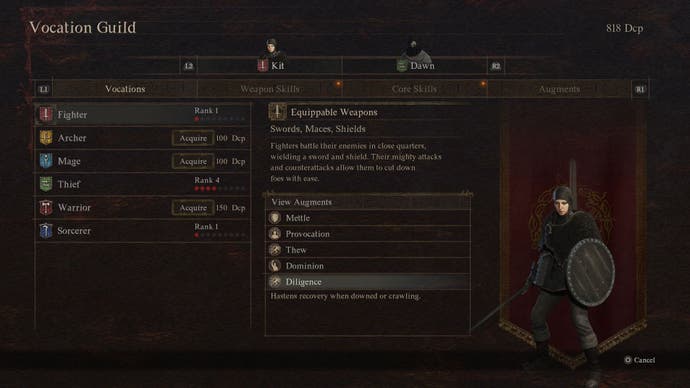
Archer
The Archer Vocation is focused around range combat. (Not surprising really, it's not like one of your attacks is going to be blasting a Radio 4 drama about farming.) When playing as an Archer, it's best to position yourself on the battle's edge rather than becoming trapped in the middle of combat. This will allow you to focus on taking down enemies from a distance to create openings for your allies and pawns.
As you increase your Rank as an Archer, you'll be able to gain new Weapon Skills and find arrows which will let you inflict debilitations upon your enemies, such as sleep or simply setting them on fire. This effectively allows you to control the battlefield from a safe distance if done correctly, especially since you have the ability to quickly switch between targeted foes. It does, however, require good Weapon Skill management as using these will help your arrows fly further and deal more damage. You can also use Steady Shot to focus on an enemy's weak spot to, once again, support your allies in their attacks.
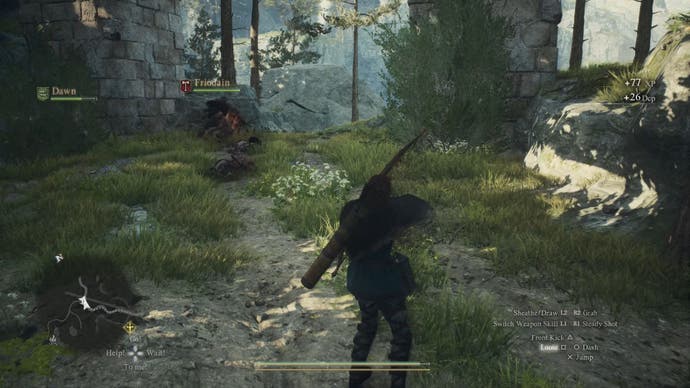
Being an Archer comes in quite handy during the opening hours of Dragon's Dogma 2 since you'll find yourself encountering a number of harpies. Since harpies can fly, being an Archer will give you an advantage against them compared to the melee-focused Vocations since you can literally shoot them out of the sky. Though, it's important to remember that Dragon's Dogma 2 is an open world game, so you shouldn't pick your Vocation based on this fact alone.
If you do decide to become an Archer, then it's a good idea to have your Main Pawn's first Vocation be either Fighter or Thief. This will allow them to jump into the heat of battle, while you support them from the sidelines.
Fancy playing as an Archer? Then check out our best Archer build recommendation.
Below you'll find the Archer Vocation Augments:
- Ambuscade - Increases damage dealt by your attacks when targets are not in battle stance.
- Endurance - Increases your maximum Stamina.
- Radiance - Causes your lantern to consume less oil and illuminate a wider area.
- Lethality - Increases damage dealt when striking a target's vitals.
- Avidity - Enables you to clamber up cliffs and scale foes and other surfaces more quickly.
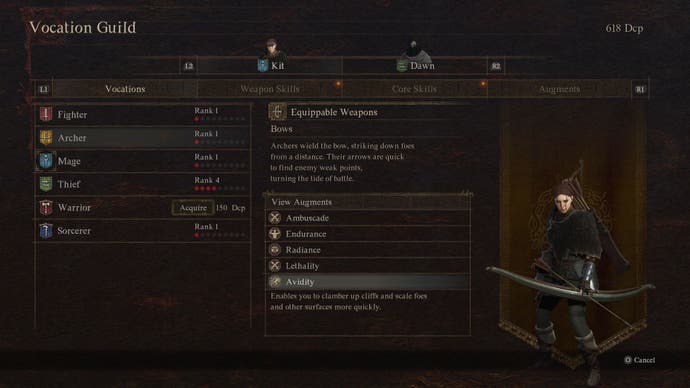
Mage
The Mage Vocation can be seen as a mixture of a support and combatant Vocation due to how it allows you to both give and take health. You'll have a range of spells at your disposal that will deal damage, but can also grant elemental abilities to your Pawn's weapons for a short amount of time. Curative Magick will also allow you to heal both your own and your Pawn's health - just make sure they're in range when you cast it!
When playing as a Mage, it's very important to remember that spells take time to cast. On top of that - the more powerful the spell, the longer it will take to cast. (The same rule is applied to the Sorcerer Vocation.) While you can move while spell casting, this will also increase the time it will take to do so. For this reason, like with being a Archer, it's a good idea to avoid the midst of combat when playing as a Mage, because, even though you can heal yourself, you will be quite vulnerable. Thankfully, some spells allow you to change targets while enchanting, so, by keeping an eye on enemy health bars, you'll be able to decide where best to aim your attack.
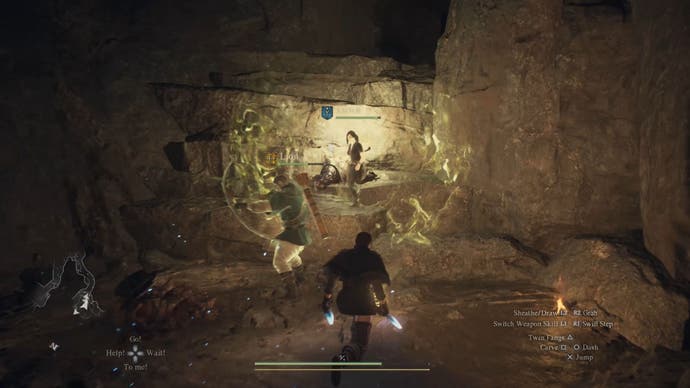
Like the Archer, it's worth having your Main Pawn be either a Fighter or Thief if you're playing as a Mage. This way you'll have someone defending you while you focus on casting spells. Though, you may also want to consider having a fellow Mage in your Pawn party as casting the same spell alongside them will decrease the amount of time it will take to cast.
Check out our best Mage build guide if you're planning on making your Main Pawn a Mage or play as one yourself. Mage is also an excellent choice for your early Main Pawn build.
Below lie the Mage Augments:
- Apotropaism - Augments your Magick Defense.
- Beatitude - Increases the amount of Health recovered by curatives and curative magicks.
- Intervention - Reduces the duration of debilitations you are afflicted with.
- Perpetuation - Extends the duration of enchantments and invigorations.
- Exaltation - Augments your Stamina recovery speed.
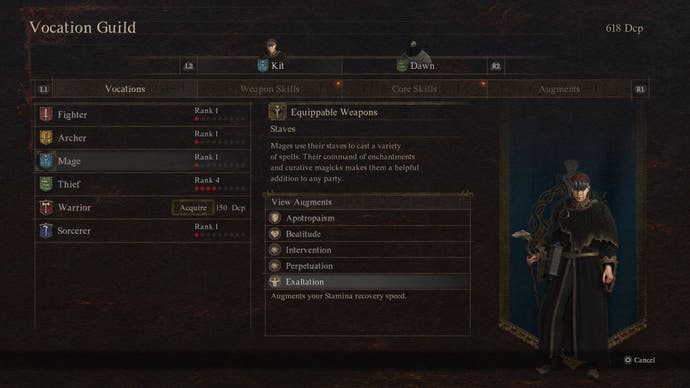
Thief
Thief is a melee-combat focused Vocation, but, unlike the Fighter, you won't be able to use a shield. Instead, you'll be focusing on dealing strong attacks quickly and dodging enemy attacks or using your abilities to hide from enemies completely. For this reason, you'll want to keep a good eye on your Stamina when playing as a Thief.
As mentioned, the key to playing as a Thief is knowing when to attack and when to flee. Thankfully, the Swift Step ability helps you quickly dodge enemy attacks or reposition yourself around foe before dealing some deadly damage. You can also use the Twin Fang attack to pin an enemy to the ground before inflicting some more damage. This will, however, leave you vulnerable to enemy attacks, so it's best to avoid doing so if you're surrounded by enemies.

Thieves can also use Twin Fangs to cling to larger enemies where you can unleash one of their many Weapon Skills. Some of the skills have the ability to inflict debilitations, so you'll want to make sure your Weapon Skills are balanced. Like Fighters, the Thief Vocation also has the ability to inflict follow-up attacks if an enemy is downed, knocked off balance or not expecting your attack at the risk of leaving you vulnerable.
When it comes to choosing your Main Pawn's Vocation, the Thief works best with the Mage, thanks to the healing and elemental boosts they offer, or, once you've unlocked it, the Sorcerer due to how this Vocation can replenish your lost Stamina.
Take a look at our best Thief build recommendation if fancy using this Vocation.
Here are the Thief Augments:
- Subtlety - Decreases the likelihood of being targeted by foes.
- Gratification - Slightly restores Health when you deliver the killing blow to a foe.
- Poise - Reduces the Stamina consumed when struggling in a foe's grip.
- Vigor - Reduces the Stamina consumed when clinging to or pinning down foes.
- Verve - Augments your Strength.
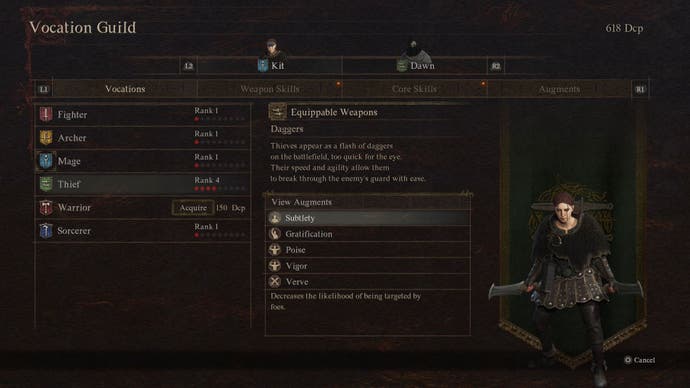
Best late game Vocations in Dragon's Dogma 2
You'll find yourself unlocking six additional Vocations as you journey through the world of Dragon's Dogma 2 and, by the time you've reached the game's late stage, you'll hopefully have access to all 10. Which Dragon's Dogma 2 late game Vocation is best for you, however, is still a subjective matter, especially since you'll have been crafting your Main Pawn's build alongside your own. Though do take a look at our Vocations tier list at the top of this guide if you want to know where we rank each one.
The new Vocations you'll eventually unlock are:
It's important to note that, aside from Sorcerer and Warrior, these Vocations are exclusive to the Arisen and can not be used by Pawns.
You may find that you wish to remain with one of the starting Vocations, such as Thief, since you've unlocked the majority of its Weapon Skills and know how to apply them in combat best. On the other hand, you may have enjoyed jumping between the different Vocations and have unlocked a variety of different Skills and Augments. If this is the case for you, then you might want to consider becoming a Warfarer due to how they can use any weapon and skills from any Vocation. There are some downsides to this Vocation, such as having lower base stats compared to the others, which we touch upon in its dedicated section.
No matter which Vocation you find yourself leaning towards, it's a good idea to seek out its Vocation Master. Gaining their trust will eventually allow you to unlock new, powerful, skills for that specific Vocation which can really give you an edge in combat.
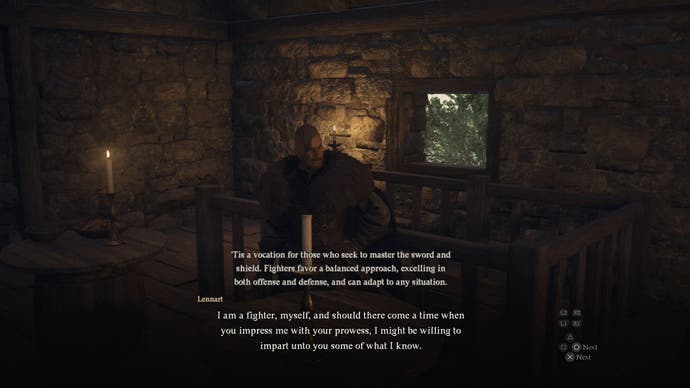
We still recommend ensuring that your Main Pawn's Vocation compliments your own since they, along with the Arisen, are the core members of your party. After all, while you can hire other Pawns, only your Main Pawn will level up. Now is also the time to take Pawn Specialisations into account as these can come in quite handy on your journey.

Here's a more in-depth look at the Vocation you'll gradually unlock during Dragon's Dogma 2:
Sorcerer
In many ways the Sorcerer Vocation is an attack focused upgrade to the Mage. Using it will allow you to deal magic attacks over wide areas with the aim of targeting multiple enemies. Depending on the spell, you may also be able to inflict debilitations. Much like the Mage, some spells allow you to switch targets and you can reduce casting time by being near a Sorcerer using the same spell.
The main difference between the Sorcerer and the Mage, however, is that, instead of recovering health, Sorcerer's recover Stamina. Galvanize allows you to recover Stamina whenever you like and comes in handy when casting more powerful spells - power equals Stamina after all.
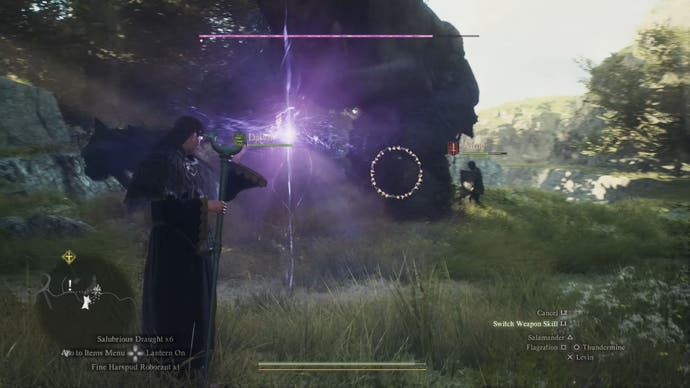
Overall, the Sorcerer is perfect for anyone wanting to use magic for violence rather than support. When choosing your Pawns, you'll want to ensure you include at least one melee attacker to ensure they can defend you when casting spells. You may also want to consider having a fellow Sorcerer, so you can benefit from the reduced casting time.
Here are the Sorcerer Augments:
- Asperity - Increases the likelihood of inflicting debilitations with your attacks.
- Stasis - Reduces the rate at which items deteriorate.
- Constancy - Augments your Knockdown Resistance.
- Catalysis - Increases damage dealt when exploiting a hostile target's elemental weakness.
- Sagacity - Augments your Magick.
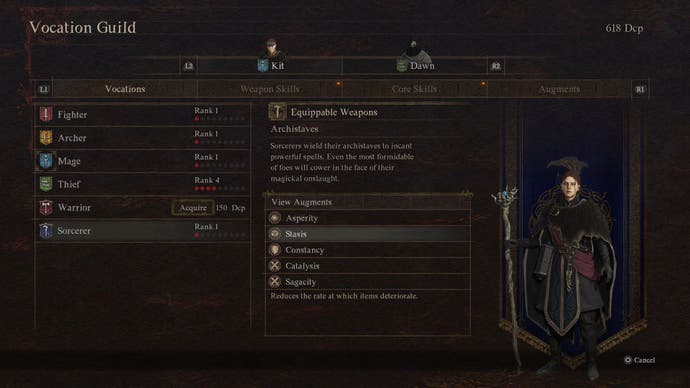
Warrior
Being a Warrior is all about taking the lead in battle and using the advanced range your massive sword gives you to attack multiple enemies. The negatives come in the form of a reduced attack speed and, even with the increased health Augment, a Warrior can not survive alone for long.
There are two attacks you should be aware of if you fancy playing as a Warrior. The first is Charged Slash - a strong attack that can deal a good amount of damage, with the added bonus that, while you're charging it, you'll have increased resistances and are less likely to flinch. The second is Barge which, while less powerful, is a far quicker attack and benefits from the same resistance bonuses as Charged Slash.
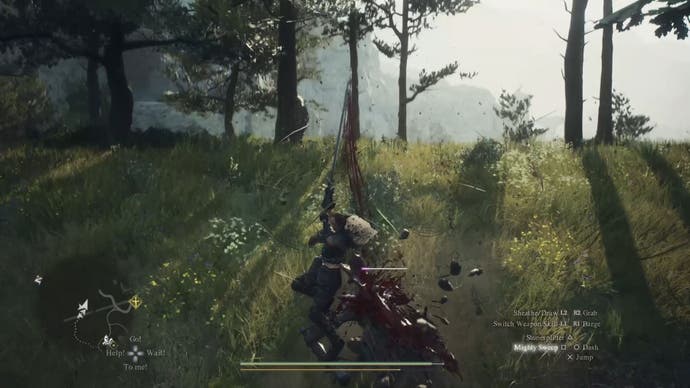
In many ways, the Warrior is an advanced version of the Fighter - much like how the Sorcerer is for the Mage. You can even still use follow-up attacks if the foe you're facing is unaware of your existence, knocked back or downed. When it comes to selecting your Pawns, it's a good idea to include some ranged based attacks in the form of Archers or Mages to make sure you're covered when entering the fray.
If you're planning on using this Vocation, check out our best Warrior build recommendations.
Below you'll find the Warrior Augments:
- Vitality - Increases your maximum Health.
- Impact - Improves your ability to push and pill targets when grabbing hold.
- Pertinacity - Improves your ability to break through an opponent's guard.
- Dominance - Augments your Knockdown Power.
- Intrepidity - Reduces cumulation of the loss gauge when receiving damage.
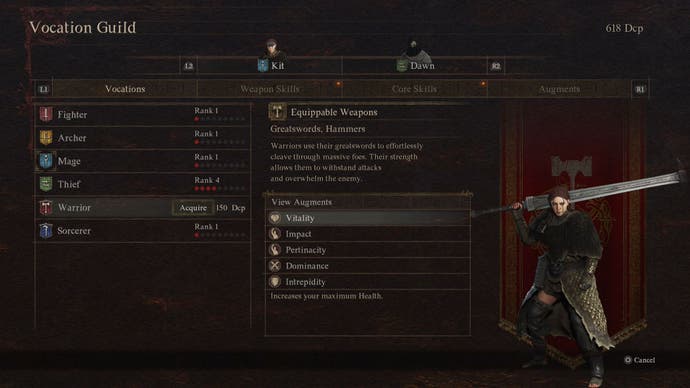
Mystic Spearhand
Mystic Spearhand is one of the best Vocations in Dragon's Dogma 2 due to how it allows you to utilise both magic and melee-based attacks. Not only that, the Dueospear gives you the chance to fight at range or up close. It also offers great movability as you can dash through battle and, eventually, teleport. The Mystic Spearhand really feels like it takes the best parts of a magic and melee-based Vocation and mixes them together, which is probably why it's exclusive to the Arisen.
This Vocation also offers a strong skill set including the likes of Mirour Vesture, which offers support by crafting a shield around yourself and allies, and Thef's Houd, which lets you steal stamina from your foes. There's also Dragoun's Stabbe, and its upgraded version Dragoun's Foin, lets you swiftly travel across the battlefield to attack a foe. It's a move which can also be performed in mid-air - something which can come in very handy.

Mystic Spearhand's Redbouted Bolt also allows you to control the battlefield by charging a magic attack which can stop an enemy from moving. The longer its charge, the longer the enemy will be trapped and the more blows you can inflict. Finally, the Mystic Spearhand, like many of the other Vocations, has the ability to perform follow up attacks.
Visit our best Mystic Spearhand build recommendation if you are planning on using this Vocation.
Here are the Mystic Spearhand Augments:
- Conveyance - Hastens movement speed while carrying or lifting.
- Opulence - Increases gold obtained when acquiring coin pouches.
- Polarity - Augments your Strength during the day and your Magick anight.
- Refulgence - Increases the amount of rift crystals obtained when acquiring rift fragments and the like.
- Athleticism - Reduces Stamina consumed when dashing.
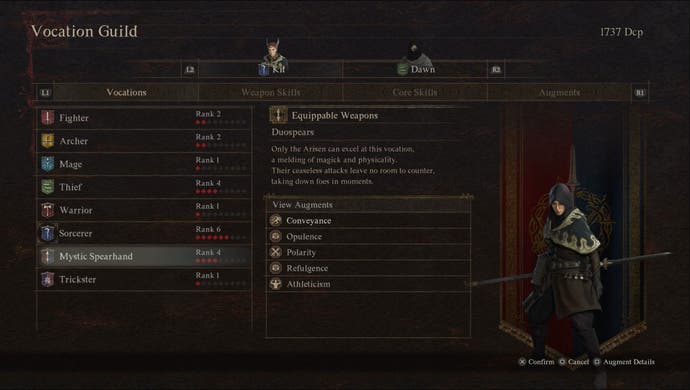
Magick Archer
Magick Archer combines the Archer Vocation with that of the Mage and Sorcerer so that you can deal magic attacks with a bow. It's also one of the Vocations exclusive to the Arisen.
One of the greatest advantages the Magick Archer has is its ability to use homing arrows, which will automatically target an enemy. This allows you to quickly move from one target to another with the assurance your blow will land its mark. When it comes to larger enemies and bosses, a Magick Archer is able to focus upon their weak spots like the glowing spots on a golem. This ability is incredibly useful if you plan on dealing elemental damage, such as setting fire to or shocking an enemy.

Magick Archers, in fact, have access to types of shots - narrow and wide. Narrow is ideal for focusing on weak spots, while wide shots were made for crowd control and dealing strong area-of-effect attacks.
Finally Magick Archer's have access to one notable skill, the Martyr's Bolt. For the price of a lot of health and increased loss gauge, you can deal a ridiculous amount of damage. It's perfect for pulling victory from the jaws of defeat - just make sure you stay alive afterwards.
Planning on using this Vocation? Then take a look at our best Magick Archer build recommendation.
Below you'll find the Magick Archer Augments:
- Sustainment - Augments the physical Defence and Magick Defense of Pawns in your party.
- Voracity - Recovers a small amount of Stamina when you deliver the killing blow to a target.
- Prolificity - Increases the likelihood that smaller targets will drop items.
- Ascendancy - Augments the Strength and Magick of Pawns in your party.
- Amelioration - Reduces the amount of time taken for fallen Pawns to revive.
Trickster
Trickster is a support class exclusive to the Arisen. It's not suited for direct combat at all and, if playing as one, you should focus on supporting your Pawns in battle by distracting and confusing your foes. Due to this, it's important to ensure you're accompanied by a well suited collection of Pawns and ideally are running a damage-dealing-focused build on your Main Pawn.
Since it's so support focused, the Trickster Vocation can not deal direct damage when attacking with a censer. Instead, this weapon is used to draw an enemy's attention to you and can summon a clone, called a Simulacrum, to further confuse them. Simulacrums have their own health and vanish if this is decreased, you wander too far from them or you take damage. You'll find that a Trickster's Strength stat is boosted to help draw a foe's attention, while their Magick is increased to help support the Simulacrum's health.
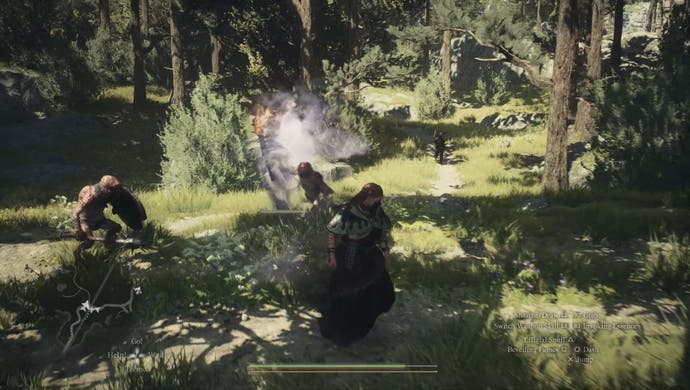
Skills like Sweeping Shroud let you cast smoke over longer distances to attract the attention of a foe further afield. While Mending Vapor slowly repairs a Simulacrum and Enthralling Aroma lets your close possess an enemy to cause its allies to attack them.
While the Trickster is a tricky Vocation to use (sorry) due to its inability to cause direct damage, it's still work increasing its rank to gain access to its incredibly useful Augments; one helps you find Seeker Tokens, while another helps you romance characters.
We also have a best Trickster build recommendation if you're considering using this Vocation.
Here's the full list of Trickster Augments:
- Detection - Alerts you to the presence of any Seeker's Tokens or Wakestone shards in the vicinity with sound and blinking light.
- Enlightenment - You have a chance of creating one more of the resulting product when combining materials.
- Fugacity - Decreases the likelihood of being beset by hostile targets while camping or riding in an oxcart.
- Obfuscation - Decreases the likelihood that hostile targets will detect you when you are not in a battle stance.
- Allure - Enable you to raise your affinity with people more easily.
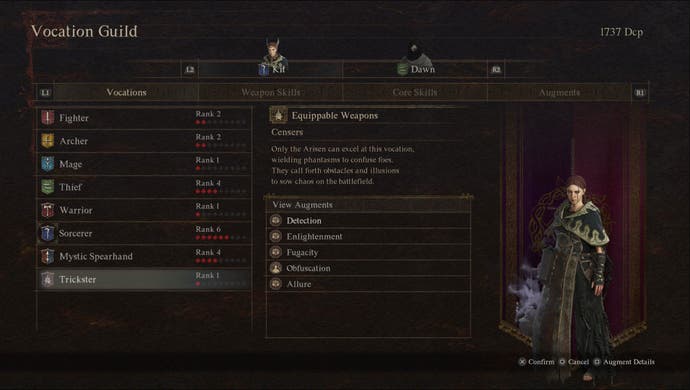
Warfarer
Warfarer is unique in how it lets you use any weapon in Dragon's Dogma 2 and skills from across all the other Vocation. The price it pays for the uniqueness is having the lowest base stats compared to the other Vocations and being exclusive to the Arisen.
One important fact to note about the Warfarer Vocation is that it only has one Weapon Skill, Rearmament, and this is crucial to how it plays. You literally can not be a proper Warfarer without it, because Rearmement lets you switch between the different weapons you carry and, by doing, use skills from other Vocations. Thankfully, you have the ability to decide the order in which you place these weapons so you don't have to deal with a random cycle. The downside, however, is that it takes up one of your Weapon Skill slots which feels counteractive to the freedom this Vocation is meant to offer.

You do still have a grand amount of freedom with your Warfarer build though and, when crafting it, you try to be as flexible as possible. Ensuring you have an equally matched set of support and melee-focused skills on hand will give you the opportunity to switch between dealing damage and keeping your party alive or providing boosts depending on your preference. When it comes to your damage-dealing skills, it's also a good idea to ensure you have both melee and ranged skills on hand.
Unlike the other Vocations, the Warfarer Vocation only has two Augments:
- Zeal - Reduces the Stamina consumed when performing a weapon skill.
- Dynamism - Reduces the amount by which weight affects your movement speed.

Good luck finding the best Vocation for you in Dragon's Dogma 2!


















